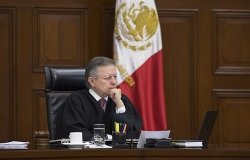Progress Building Democracy in Nigeria
A Director's Forum with His Excellency Atiku Abubakar, Vice President of the Federal Republic of Nigeria. The full text of the speech is available for download. Watch a video of the vice president's presentation.
Overview
The video of this presentation, and full text of the Vice President's remarks are available by following the links at the righthand side of this screen.
His Excellency Atiku Abubakar, Vice President of Nigeria
Moderator: Ambassador Johnnie Carson, Senior Vice President, National Defense University
Addressing a standing-room only crowd at the Wilson Center, Nigerian Vice President Atiku Abubakar delivered a director's forum presentation focusing on the progress that Nigeria has made since the introduction of electoral democracy, and the challenges that remain as the nation prepares itself for presidential elections in 2007. In his introduction, Johnnie Carson observed that as Africa's most populous nations, and one of the most important nations in West Africa, Nigeria's continued success in building democracy is vital both to American policy in Africa, as well as a topic of regional, continental and global significance.
Although Nigeria faces many challenges in the years ahead, including corruption, oil bunkering and crushing international debt, Vice President Abubakar observed that Nigeria has made tremendous progress to date, and can rely on a strong relationship with the U.S. as it seeks to entrench democratic values and institutions. He praised the progress made under President Obasanjo, who came to power in elections organized hastily after the end of the death of General Sani Abacha in 1999. While acknowledging allegations of voter fraud in past elections, he vowed that with strong international support, the 2007 elections would be free, fair and reflect the will of the Nigerian people. However, on the broader question of deepening the democratic transition, internal corruption looms as one of the most prominent challenges to democratic governance.
To this end, Vice President Abubakar advocated fostering a culture of anti-corruption, including the formation of a national anti-corruption commission that could help rein in official government corruption. He related the fight against corruption to the threat posed by oil bunkering—siphoning oil off commercial pipelines for illegal sale on the black market—that saps the productivity of Nigeria's rich southeastern oil fields. He described this practice as "terrorism" that weakens the Nigerian state, and the international community, to the financial profit of a select few.
He also addressed the topic of international debt, noting that last year, Nigeria paid $1.8 billion towards servicing its debt, eleven times the country's budget for education and health combined. The current state of affairs is untenable, the Vice President argued, and if Nigeria were to have paid off its entire $2.9 billion in debt, it would have brought the government to a standstill. An alternate solution must be found, he argued, if Nigeria is to meet the Millennium Development Goals, and some sort of debt relief arrangement would need to be made with developed nations, including the U.S.
The Vice President's remarks were followed by a question-and-answer session, featuring a number of provocative questions focused on speculation as to who might emerge as candidates in the 2007 presidential elections. While refusing to comment on suggestions that he may himself stand for election to the presidency, V.P. Abubakar responded to rumors that President Obasanjo may run for a third term by referring to Obasanjo's declared intent not to stand for re-election.
The Vice President also offered several observations about Nigeria's economic future. When asked what single development would be most useful to unlocking Nigeria's economic potential, he argued that a primacy be placed on rural electrification projects, in order to stimulate growth and improve livelihoods outside of major urban centers. He also observed that while much attention was paid to the Nigerian oil sector, he viewed increased agricultural production and exportation as the most important growth industry, suggesting that one day, soy exports may well eclipse petroleum sales.
Atiku Abubakar is Nigeria's second-ever democratically elected vice president. Prior to being named Vice President, he served as Governor of Adamawa state, and was a member of the G18 and G34 pressure groups that opposed the Abacha regime, eventually leading to the reinstatement of civilian rule in Nigeria.
Africa Program Staff, ext. 4097
Howard Wolpe, Director
Documents & Downloads
Hosted By

Africa Program
The Africa Program works to address the most critical issues facing Africa and US-Africa relations, build mutually beneficial US-Africa relations, and enhance knowledge and understanding about Africa in the United States. The Program achieves its mission through in-depth research and analyses, public discussion, working groups, and briefings that bring together policymakers, practitioners, and subject matter experts to analyze and offer practical options for tackling key challenges in Africa and in US-Africa relations. Read more
Thank you for your interest in this event. Please send any feedback or questions to our Events staff.









